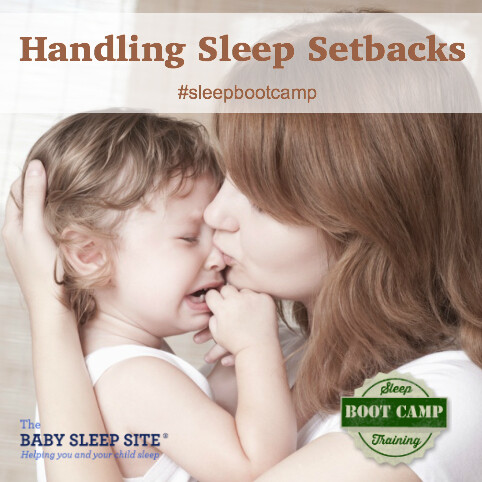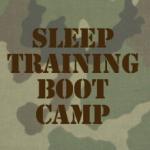
New to Sleep Training Bootcamp? Check out our overview page to find out what Sleep Training Boot Camp is all about, and to catch up on past Boot Camp articles.
BOOT CAMP, PART SIX: Handling Sleep Setbacks

Boot Campers, you have come SO FAR! Can you believe we’re already at part six of our seven-part series?! For those of you who have been sticking with us this month, and doing the hard work of sleep training – keep it up! You’re almost there! And don’t forget, if you’re feeling discouraged, or if you had to give up because your sleep coaching plans just weren’t working, don’t despair – we can help!
We hope that, at this point, that you are starting to see some improvements in sleep. Sure, things may not be perfect yet – in fact, you may still be a long way from perfect! But ALL progress is good progress. 🙂
Today, we’re taking a look at some of the most common sleep setbacks that parents face. Don’t forget that, even when sleep coaching is done, and when your baby or toddler’s sleep is exactly where you want it to be, there will still be setbacks you have to contend with. Specifically, the most common sleep setbacks we see parents struggling with include…
- …sleep regressions.
- …teething.
- …illness.
- …traveling.
- …potty training.
- …transitioning to a big kid bed.
- …welcoming a new sibling into the family.
- …moving to a new house.
These are all things that can disrupt sleep in a big way – and the disruption can last anywhere from a few days to a few weeks. So, how can you cope with these setbacks?
Vikki is back to share some tips with us, and to tell us a little bit about the sleep setbacks she’s faced, and how she’s coped. Let’s hear more!
Handling Sleep Setbacks: Vikki’s Sleep Training Story
 My little Lyla Kathleen is not a good sleeper. While today she is a dramatically better snooze artist than she was before I started working with The Baby Sleep Site®, there are still struggles. I think there always will be. I have come to terms with the fact that she’s just never going to be a kid that chooses to go to sleep when she’s tired. Throw in a growth spurt, getting sick, or some teething, and the baby food really hits the fan!
My little Lyla Kathleen is not a good sleeper. While today she is a dramatically better snooze artist than she was before I started working with The Baby Sleep Site®, there are still struggles. I think there always will be. I have come to terms with the fact that she’s just never going to be a kid that chooses to go to sleep when she’s tired. Throw in a growth spurt, getting sick, or some teething, and the baby food really hits the fan!
After about eight weeks of following my Personalized Sleep Plan™ and working with Jen, our sleep consultant, little Lyla Kat was falling asleep on her own for naps and at bedtime, and was sleeping through the night about five days a week. This was a dramatic improvement from the previous ten months of nightly tear-streaked faces (hers and mine) and intense whisper fights with my husband about what to do with our exhausted child. I was overjoyed. Jubilant. Euphoric. My baby had peace. I got sleep. Life had reached a new normal that included gobs of glorious slumber. It was amazing. Until it wasn’t.
After weeks of going to sleep so well and sleeping through the night most of the time, at 2 a.m. one morning, I heard a little cry. Then I heard a big scream. I went through the checklist: diaper was fine; temperature in the room was fine; no apparent injuries or indications of being sick or having teeth pain. We had recently weaned from nursing, and I thought maybe she was experiencing some separation anxiety. Maybe she just needed momma. It was kind of sweet. It took an hour to get her back to sleep. I decided it was a hiccup and laid down with a smile, happy I got a little extra time with my girl.
I was not smiling the next night when 2 a.m. rolled around and it happened again. And again the next two nights. Was this separation anxiety or “I just don’t want to sleep”-iety? Was there a lurking tooth? I had no idea, and Lyla wasn’t talking.
I had this horrifying fear that her newfound ability to sleep was only temporary. Or worse, that my child was untrainable and she would be awake the rest of her life. Please note I was very tired. While I was being slightly dramatic, the feeling of failure was very real. She had been doing so well. We’d worked so hard and come so far. Where did we go wrong? I had a pit in my stomach, and I kept thinking, now that sleep training is a failure, where do we go from here?
Sleep Setbacks Do Not Equal Sleep Failure
 After my initial freak about those middle of the night wake-ups, I took three deep breaths, and realized that Lyla’s waking up didn’t mean all our work was lost. It meant something was hindering her from utilizing the tools we taught her, and my job was to get her back on track.
After my initial freak about those middle of the night wake-ups, I took three deep breaths, and realized that Lyla’s waking up didn’t mean all our work was lost. It meant something was hindering her from utilizing the tools we taught her, and my job was to get her back on track.
Here’s what I’ve learned since then: when Lyla has “sleep weirdness” as a result of teeth, growth, general fickleness, etc., her disrupted sleep usually lasts about a week. It took a few episodes for my husband and I to realize this pattern. Once we did, though, it helped us stick to our sleep rules, because we knew it was temporary. And after she worked through whatever was causing the disruption, if we stuck to the training, her improved sleep habits returned.
I realized through this process that setbacks are temporary, but sleep training is for life. I didn’t need to make any huge changes or come up with a new strategy. I just had to comfort my baby and reinforce our training. I went back to the plan and the sleep rules, and Lyla, thankfully, went back to sleep. The “fix” for these setbacks was to stay consistent. Remind baby and yourself of the sleep rules. If they aren’t working, like we talked about with naps in the last post, find what works. Update the rules to reflect what your baby needs long-term, but don’t make hasty changes that only solve for the short-term.
Whether your baby is a good sleeper that just needs some fine-tuning, or is a chronically awake little person, like my little bean, there will be setbacks. But remember: SETBACKS DON’T MEAN FAILURE. Even after you’ve found the sleep training approach that works for you and baby, stuff comes up. For us, since training, there have been litanies of slumber-altering situations, including never-ending teething (her pediatrician calls her “Jaws”), the end of the binky era (RIP Pinky the Binky) and, of course, when I stopped nursing.
Sometimes you know or can guess what causes the disruption. Or, especially when they’re too young to talk, it’s a total mystery. But work the steps. Stick to your rules. Keep your sleep routine as normal as possible. If there is a temporary cause to the disruption, no need for a wholesale change in approach. With sleep training, it’s not about big huge flailing moves to get the desired result. It’s about small, specific choices to help direct baby back to the path to sleep.
So, my fellow sleep-seeking parents, please know that even the best sleeper (born or taught) will have times when they struggle to siesta. But a setback does not mean sleep training failure. It means helping baby use the sleep tools even when his/her baby mouth hurts or their internal sleep clock is a little off. Get back to our routine when you can, and baby will, too!
Help For Handling Sleep Setbacks
Isn’t Vikki full of good advice? It’s key to keep her main point in mind when sleep training: sleep setbacks don’t mean sleep training failure! It’s best to stick to your plan, to try and continue fostering good sleep habits, and to just get through the rough patch as best you can.
Of course, that’s sometimes easier said than done, right? Some “rough patches” can be particularly rough! If you find that you need help navigating sleep setbacks (or if you just need help with sleep coaching, period!), I hope you’ll consider a sleep consultation with one of our expert sleep consultants.
Browse our list of sleep consultation packages here.
Once you purchase a package, you will immediately receive access to our Sleep Helpdesk, where you can upload your family sleep history form, connect with your consultant, and get started on your journey to better sleep!

What’s your plan for handling setbacks, boot campers?
<--Boot Camp Part Five: What You Need To Know About Nap Training
Boot Camp Part Seven: Celebrate Success (No Matter How Small!)–>






